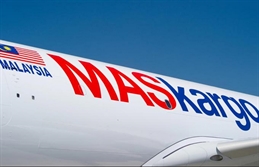
Following Malaysia Airlines’ (MAS) discontinuation of passenger flights to Frankfurt, the carrier’s cargo arm, MASKargo, has also cut off direct links by stopping its thrice-weekly cargo flights to Germany’s financial capital effective May 31.
MASKargo, which operates three flights to Amsterdam, will add two freighter flights to Amsterdam, increasing the total number of cargo flights to five each week.
“MAS operates a daily passenger flight to Amsterdam which also carries belly-hold cargo. The total cargo capacity to Amsterdam presently is around 370 tons a week, transported both on passenger planes and freighters. With two additional MASKargo freighter flights a week, the tonnage is expected to increase from 370 to roughly 570 tons a week,” explained Keesjan de Vries, MASKargo’s Amsterdam-based regional cargo manager, in an interview with Asia Cargo News at the recent Transport/Logistics 2015 Fair in Munich.
However, many Malaysian logistics professionals at Munich’s transport/logistics show – there were eight Malaysian logistics companies, including MASKargo, at the event - privately expressed fears that MASKargo, with the discontinuation of its freighter flights to Frankfurt, could lose its foothold in Europe’s biggest economy, where exports have been rising exponentially, thanks also, lately, to the euro’s depreciation against the US dollar.
“I am worried I may lose some business because of the non-availability of direct cargo flights from Kuala Lumpur,” one Malaysian shipper/forwarder told Asia Cargo News. He argued that most importers prefer to have their shipments delivered directly in their own country rather than have them routed through a third country – in this case the Netherlands – which can increase the handling costs. “I agree, Schiphol has good feeder services but just look at the airport’s location. Yes, it is close to certain cities in Germany, but if you have someone in down south in places like Bavaria or Baden-Wuerttemberg, it does not make business sense to ship via Amsterdam,” the Malaysian forwarder maintained.
Nonetheless, MASKargo’s booth saw a steady stream of trade visitors to their booths at the show.
“We have been busy here receiving visitors at our booth, but I have also been visiting other halls and calling on companies and visitors of interest to our business. As you can see, the entire industry is here from shippers, general sales agents, handlers, forwarding agents, etc.” de Vries added.
Usaha Meriah, which is based in Kota Kinabalu in the Malaysian state of Sabah, specializes in providing services to incoming and outgoing vessels, and also offers door-to-door services.
“A large part of the cargo handled by us is related to Malaysia’s trade with China, but we also handle cargo to other neighbouring places. My personal view is that China and India are the two bright spots presently seen on the world map,” said Kelvin Lee, the company’s business development manager. “Some German manufacturers approached us for collaboration in promoting their products in Malaysia,” Lee added.
KLIA Premier Holdings of Selangor specializes in project management in railways and airports. “We are doing a feasibility study for the Kulim airport which will be developed as a cargo hub besides, of course, having a passenger operation. We had visitors from Singapore, the Netherlands, China, India, Iran, etc.” said Nadirah Hazwani Najib, the company’s manager (professional/technical team).
Some Malaysian logistics players expressed fears that MAS and MASKargo are planning to completely withdraw from Europe as part of the restructuring process, in which the airline is increasingly turning to the Asia-Pacific region, as evident from the cargo carrier’s recent addition of Bangalore to its cargo network using an A330-200 freighter every Friday.
The plan to withdraw from Europe has inspired speculation within Malaysia’s logistics industry that MAS was planning to sell its A380 superjumbo aircraft. Some Malaysians were saying that they had heard from “industry insiders” that MAS is going to sell or lease out six A380 aircraft. Another route in Europe that may be sacrificed at the cost-cutting altar is Paris, followed by London, if the sale of the A380 aircraft does materialize. “[The A380 aircraft sale] could be interpreted as an indication of an impending withdrawal from other European destinations,” one Malaysian maintained.
Despite MASKargo’s withdrawal from some European destinations, Malaysia continues to remain an interesting market and also a regional distribution center. European carriers are eyeing not only Malaysia but also the Association of Southeast Asian Nations (ASEAN). Lufthansa, for example, has increased its number of flights from five to seven each week to Kuala Lumpur, thus also increasing bellyhold capacity for Lufthansa Cargo.
Gerhard Gerritzen, deputy managing director of Messe Munchen, the trade fair’s organizer, was bullish about the ASEAN region, pointing out the “excellent business potential” inherent in the logistics sector of the ASEAN group, which will move to the next level of integration by forming the ASEAN Economic Community (AEC) by the end of 2015.
“Indeed, the ASEAN group, including Malaysia, is an interesting region. You see here at the Transport/Logistics show a very large participation of foreign logistics players. A substantial part of the exhibitors come from Asia,” Gerritzen added.
Some Malaysian exhibitors were saying that airports such as Senai airport in Johor state bordering Singapore and Kuala Lumpur International need to create a higher profile internationally to highlight Malaysia’s potential as a future logistics hub. Those same exhibitors felt that if the airports had had booths in Munich, it would have helped such efforts. Senai airport has been aspiring to play what it describes as a “supplementary role” to neighbouring Changi International in Singapore, analogous to the role played by the smaller Frankfurt-Hahn airport vis-à-vis the larger Frankfurt Rhine-Main International Airport, Europe’s largest carg
By Manik Mehta
International Correspondent | Munich



